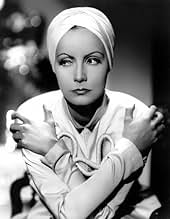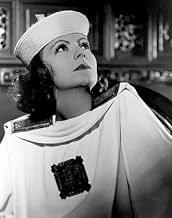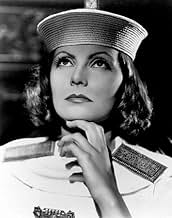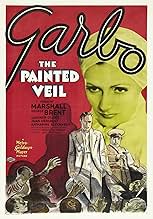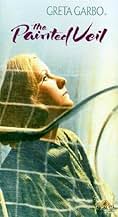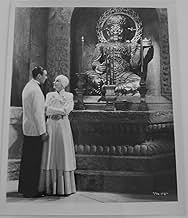VALUTAZIONE IMDb
6,5/10
1825
LA TUA VALUTAZIONE
Aggiungi una trama nella tua linguaA wife neglected by her husband, a medical researcher in China, falls in love with a dashing diplomatic attaché.A wife neglected by her husband, a medical researcher in China, falls in love with a dashing diplomatic attaché.A wife neglected by her husband, a medical researcher in China, falls in love with a dashing diplomatic attaché.
- Regia
- Sceneggiatura
- Star
- Premi
- 2 vittorie totali
Robert Adair
- Polo Player
- (scene tagliate)
Mariska Aldrich
- German Teacher
- (scene tagliate)
Maidena Armstrong
- German
- (scene tagliate)
Billy Bevan
- Bridegroom
- (scene tagliate)
Beulah Bondi
- Frau Koerber
- (scene tagliate)
W.H. Davis
- German
- (scene tagliate)
Vernon Dent
- Chief of Police
- (scene tagliate)
Recensioni in evidenza
When I watched THE PAINTED VEIL, I thought that a remake should be made. Because the story has so much potential which couldn't have been explored sans restrictions in a movie made in the 1930s. Oddly enough, when I watched this film (early spring of 2006), it was announced that a remake of THE PAINTED VEIL was in the works and it's starring Naomi Watts in the role of Katrin. Well, after hearing this bit of news, I guess a good remake has yet to be made because casting Watts in the role played by Garbo is, well, ludicrous.
The best thing about the Garbo version of THE PAINTED VEIL is Garbo herself. She outshines the whole movie. Remove her from the film and, frankly, there's no reason to watch it. Garbo plays a very difficult role and pulls it off successfully. She beautifully underplays her role, which could have easily been fodder for scenery chewing if played by other actresses of that era. Watts has big shoes to fill.
The worst part of this version are two male co-stars, who aside from being almost indistinguishable from each other, are dull. It's hard to believe any woman would be interested in either of them, character or look-wise. And the production values, though good, aren't the most effective. Even though the budget was supposedly high for that time, there's a cheap, rushed feel to it (it was shot in two months!). No location film-making in China here. Another problem is the script which is obviously a truncated version of the W. Somerset Maugham novel. Something tells me big parts of the book were left out and the story in the film looks half complete. But the basis of this odd romance is still there and I find it fascinating. It's sorta like an anti-romance romantic story, or a reversed romantic story, which I've rarely seen before and having Garbo in this was perfect casting, because of she was such an unconventional star.
I rate the movie a 5 but because of Garbo, I give it a 7.
(P.S.: I finally read the book and did not like it at all. The Garbo film is an actual improvement)
The best thing about the Garbo version of THE PAINTED VEIL is Garbo herself. She outshines the whole movie. Remove her from the film and, frankly, there's no reason to watch it. Garbo plays a very difficult role and pulls it off successfully. She beautifully underplays her role, which could have easily been fodder for scenery chewing if played by other actresses of that era. Watts has big shoes to fill.
The worst part of this version are two male co-stars, who aside from being almost indistinguishable from each other, are dull. It's hard to believe any woman would be interested in either of them, character or look-wise. And the production values, though good, aren't the most effective. Even though the budget was supposedly high for that time, there's a cheap, rushed feel to it (it was shot in two months!). No location film-making in China here. Another problem is the script which is obviously a truncated version of the W. Somerset Maugham novel. Something tells me big parts of the book were left out and the story in the film looks half complete. But the basis of this odd romance is still there and I find it fascinating. It's sorta like an anti-romance romantic story, or a reversed romantic story, which I've rarely seen before and having Garbo in this was perfect casting, because of she was such an unconventional star.
I rate the movie a 5 but because of Garbo, I give it a 7.
(P.S.: I finally read the book and did not like it at all. The Garbo film is an actual improvement)
Greta Garbo stars with Herbert Marshall, George Brent, Warner Oland, and Jean Hersholt in "The Painted Veil," from 1934, based on the novel by Somerset Maugham. Garbo plays an Austrian woman, Katrin, who grabs at the chance to marry her father's research assistant, Walter Fane (Marshall) after her sister marries and leaves home. At first, they are happy, as Katrin gets to see parts of the world she hasn't seen. Soon, however, she becomes lonely, as Walter is busy fighting a cholera epidemic.
Katrin falls for Jack Townsend (George Brent) from the British embassy, and the two enter into a passionate affair. Walter finds out; then Katrin is humiliated when she realizes that Jack cares more for his reputation than her and does not seem willing to get a divorce. Walter insists that she travel with him as he goes deeper into China to fight the epidemic; she realizes he just wants her to get sick and die.
Garbo is incredible in this film - warm, sweet, and flirtatious in the beginning, and rising to the dramatic challenges later, she gives a beautifully layered, sympathetic, and powerful performance. Marshall is very good, as is the rest of the cast - but Garbo just walks away with the whole thing. A very unusual presence and talent, very passionate and committed. It's such a shame that she didn't pursue opportunities for films in Europe after the war.
Also, the Chinese atmosphere (totally MGM backlot) feels very authentic.
This film ends differently from the 2006 version. Though I liked the 2006 version, it lacks the magic of this one. Magic, spelled G-a-r-b-o.
Katrin falls for Jack Townsend (George Brent) from the British embassy, and the two enter into a passionate affair. Walter finds out; then Katrin is humiliated when she realizes that Jack cares more for his reputation than her and does not seem willing to get a divorce. Walter insists that she travel with him as he goes deeper into China to fight the epidemic; she realizes he just wants her to get sick and die.
Garbo is incredible in this film - warm, sweet, and flirtatious in the beginning, and rising to the dramatic challenges later, she gives a beautifully layered, sympathetic, and powerful performance. Marshall is very good, as is the rest of the cast - but Garbo just walks away with the whole thing. A very unusual presence and talent, very passionate and committed. It's such a shame that she didn't pursue opportunities for films in Europe after the war.
Also, the Chinese atmosphere (totally MGM backlot) feels very authentic.
This film ends differently from the 2006 version. Though I liked the 2006 version, it lacks the magic of this one. Magic, spelled G-a-r-b-o.
The future looked a little uncertain for Greta Garbo in 1934. Under pressure from the rampant, crackpot Catholic League of Decency whose members were boycotting movie theatres and declaring 'purify or destroy Hollywood', the usually malleable Joseph Breen was obliged to make even stricter the Production Code. 'Mata Hari' was cut and 'Queen Christina' taken out of circulation whilst this adaptation of Somerset Maugham's 'The Painted Veil' needed to tone down its so-called sexual content and instead reflect moral values.
These factors alone cannot entirely explain why this film disappoints. Garbo's scenes with Herbert Marshall are excellent and there is a chemistry between her and George Brent owing to their relationship at the time being more than just professional. It just lacks that 'alchemy' by which everything comes together and falls below director Richard Boleslawski's usual high standards.
Garbo need not have worried as David 0. Selznick was soon to come to her aid. Whatever its flaws and despite being the least faithful to Maugham's original it remains, for this viewer at any rate, the most entertaining of the three versions. 'The Seventh Sin' of Ronald Neame and an uncredited Vincente Minnelli is rather lacklustre whilst it is probably kinder to draw a discreet veil over the most recent version directed by someone named John Curran.
These factors alone cannot entirely explain why this film disappoints. Garbo's scenes with Herbert Marshall are excellent and there is a chemistry between her and George Brent owing to their relationship at the time being more than just professional. It just lacks that 'alchemy' by which everything comes together and falls below director Richard Boleslawski's usual high standards.
Garbo need not have worried as David 0. Selznick was soon to come to her aid. Whatever its flaws and despite being the least faithful to Maugham's original it remains, for this viewer at any rate, the most entertaining of the three versions. 'The Seventh Sin' of Ronald Neame and an uncredited Vincente Minnelli is rather lacklustre whilst it is probably kinder to draw a discreet veil over the most recent version directed by someone named John Curran.
Married to a distracted English scientist, a beautiful Austrian finds forbidden love beyond THE PAINTED VEIL in China.
Based on a story by W. Somerset Maugham, this MGM film is soap opera of a high order, featuring excellent production values & acting. The dialogue is also refreshingly literate & thoughtful, something of a surprise in a film which might be pigeonholed as just an elaborate potboiler.
Fascinating as always, Greta Garbo is at last showcased in a film whose backdrop & setting matches her for exoticism. Enervated by the overwhelming cultural saturation of pre-war China, she seems freed to be essentially herself - shorn of all needs to bewitch - and is able to give herself over to the seriousness & drama of her character's dilemma. What the viewer is left with is one of her best performances.
The two men in Garbo's life are excellently portrayed by Herbert Marshall & George Brent. Neither characters are without faults, but the actors make them intimately human, revealing some of the loneliness in each man's heart. These actors had distinct similarities, making it something of a bold move for MGM to put them in the same film, but also enabling the viewer to understand why Garbo could love both.
Excellent support is given by gentle Jean Hersholt as Garbo's kindly father; Forrester Harvey as a happy-go-lucky embassy employee in China & Warner Oland as a sympathetic Chinese general.
Movie mavens will recognize Keye Luke as a young doctor and Mary Forbes & Ethel Griffies as British ladies in Hong Kong - all uncredited.
The Chinese scenes show MGM at what it did best - creating another world, utterly realistic, in its back lot.
Based on a story by W. Somerset Maugham, this MGM film is soap opera of a high order, featuring excellent production values & acting. The dialogue is also refreshingly literate & thoughtful, something of a surprise in a film which might be pigeonholed as just an elaborate potboiler.
Fascinating as always, Greta Garbo is at last showcased in a film whose backdrop & setting matches her for exoticism. Enervated by the overwhelming cultural saturation of pre-war China, she seems freed to be essentially herself - shorn of all needs to bewitch - and is able to give herself over to the seriousness & drama of her character's dilemma. What the viewer is left with is one of her best performances.
The two men in Garbo's life are excellently portrayed by Herbert Marshall & George Brent. Neither characters are without faults, but the actors make them intimately human, revealing some of the loneliness in each man's heart. These actors had distinct similarities, making it something of a bold move for MGM to put them in the same film, but also enabling the viewer to understand why Garbo could love both.
Excellent support is given by gentle Jean Hersholt as Garbo's kindly father; Forrester Harvey as a happy-go-lucky embassy employee in China & Warner Oland as a sympathetic Chinese general.
Movie mavens will recognize Keye Luke as a young doctor and Mary Forbes & Ethel Griffies as British ladies in Hong Kong - all uncredited.
The Chinese scenes show MGM at what it did best - creating another world, utterly realistic, in its back lot.
GARBO...the five-letter name, synonymous with glamour and mystery, fills the screen and overwhelms the film's title and the rest of the cast. The legendary actress, Greta Garbo, warranted the outsize billing, and her glowing image dominates this romantic triangle based on a novel by W. Somerset Maugham. Dr. Walter Fane is a research assistant in Austria, and he harbors romantic intentions for Katrin, the daughter of his superior. Summoning the courage to propose, Fane quickly weds Katrin, and the pair head to China, where Fane's friend, Jack Townsend from the British embassy, aggressively courts the often neglected Katrin. Further complications ensue when a cholera epidemic breaks out, and Fane insists that Katrin accompany him further into the Chinese interior, where she will be separated from Townsend, and he will fight the disease.
As Katrin, Garbo is luminescent. No surprise as to why, because she was photographed by William H. Daniels, who lensed 21 Garbo films, and was garbed by Adrian, who dressed her in some of her greatest roles. The screen goddess, a moniker the actress richly merits, is flawless in dress or image, whether profile or three-quarter view, close-up or full figure. When she quickly wraps a white scarf around her hair to go out, she emerges as pure elegance in full length white attire. Displaying all the mannerisms that her audience adored, from the fluttering eyelids and raised eyebrows to the subtle trembling of her mouth, Garbo is reason enough to see "The Painted Veil." Whether watching a Chinese pageant that resembles an act from the Ziegfeld Follies or running through streets filled with panicked Chinese, Garbo's makeup is pristine, her clothing spotless, and her air poised. The term "star" was coined for a screen presence such as hers.
Not surprisingly, Garbo's two male co-stars in the film pale in comparison. While neither Herbert Marshall nor George Brent were particularly memorable actors, they were often paired with strong actresses like Garbo or Bette Davis that unfairly cast them into the shadows. However, both Marshall and Brent were skilled and acquit themselves well here, although cognizant that audiences were there to see Garbo and not them. Whatever merits the Maugham novel possesses, the film's brief 85-minute running time is rushed, and motivations are not particularly convincing. The Marshall-Garbo marriage seems arbitrary and loveless from the start, and Townsend's pursuit of his friend's wife is a cold-hearted stab in the back. However, audiences did not come to analyze the characters or the plot, they came to see Garbo, and she gloriously commands attention in "The Painted Veil."
As Katrin, Garbo is luminescent. No surprise as to why, because she was photographed by William H. Daniels, who lensed 21 Garbo films, and was garbed by Adrian, who dressed her in some of her greatest roles. The screen goddess, a moniker the actress richly merits, is flawless in dress or image, whether profile or three-quarter view, close-up or full figure. When she quickly wraps a white scarf around her hair to go out, she emerges as pure elegance in full length white attire. Displaying all the mannerisms that her audience adored, from the fluttering eyelids and raised eyebrows to the subtle trembling of her mouth, Garbo is reason enough to see "The Painted Veil." Whether watching a Chinese pageant that resembles an act from the Ziegfeld Follies or running through streets filled with panicked Chinese, Garbo's makeup is pristine, her clothing spotless, and her air poised. The term "star" was coined for a screen presence such as hers.
Not surprisingly, Garbo's two male co-stars in the film pale in comparison. While neither Herbert Marshall nor George Brent were particularly memorable actors, they were often paired with strong actresses like Garbo or Bette Davis that unfairly cast them into the shadows. However, both Marshall and Brent were skilled and acquit themselves well here, although cognizant that audiences were there to see Garbo and not them. Whatever merits the Maugham novel possesses, the film's brief 85-minute running time is rushed, and motivations are not particularly convincing. The Marshall-Garbo marriage seems arbitrary and loveless from the start, and Townsend's pursuit of his friend's wife is a cold-hearted stab in the back. However, audiences did not come to analyze the characters or the plot, they came to see Garbo, and she gloriously commands attention in "The Painted Veil."
Lo sapevi?
- QuizLa regina Cristina (1933) and Il velo dipinto (1934) were both huge hits in Europe (making twice their budget in the UK alone), but were underwhelming US successes.
- BlooperA box is marked "Scotch Whiskey", which is the American spelling of whiskey. In the United Kingdom, however, it is spelled with no 'e' and is simply "whisky". Therefore, had the whisk(e)y been imported directly from Scotland, it should have had the 'whisky' spelling.
- Citazioni
Katrin Koerber Fane: [after Townsend impulsively kisses Katrin] How could you?
Jack Townsend: I could.
- Curiosità sui creditiGreta Garbo's name in the opening credits uses a font that forms the same Gothic arch in the letters as is used in W. Somerset Maugham's symbol. The other credits also use this to a lesser extent.
- ConnessioniFeatured in La buona terra (1937)
- Colonne sonoreBridal Chorus (Here Comes the Bride)
(1850) (uncredited)
from "Lohengrin"
Written by Richard Wagner
Played as background music in the wedding scene
I più visti
Accedi per valutare e creare un elenco di titoli salvati per ottenere consigli personalizzati
- How long is The Painted Veil?Powered by Alexa
Dettagli
- Data di uscita
- Paese di origine
- Lingue
- Celebre anche come
- The Painted Veil
- Luoghi delle riprese
- Cina(background shots)
- Azienda produttrice
- Vedi altri crediti dell’azienda su IMDbPro
Botteghino
- Budget
- 947.000 USD (previsto)
- Tempo di esecuzione
- 1h 25min(85 min)
- Colore
- Proporzioni
- 1.37 : 1
Contribuisci a questa pagina
Suggerisci una modifica o aggiungi i contenuti mancanti

